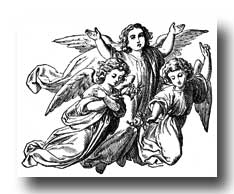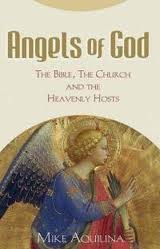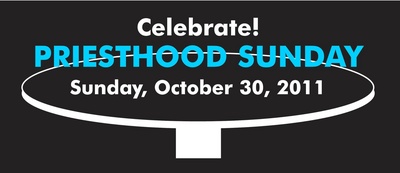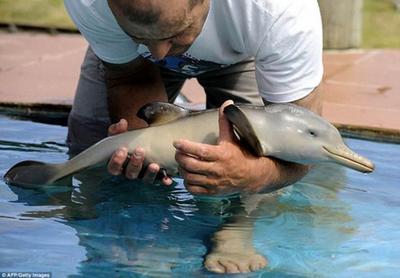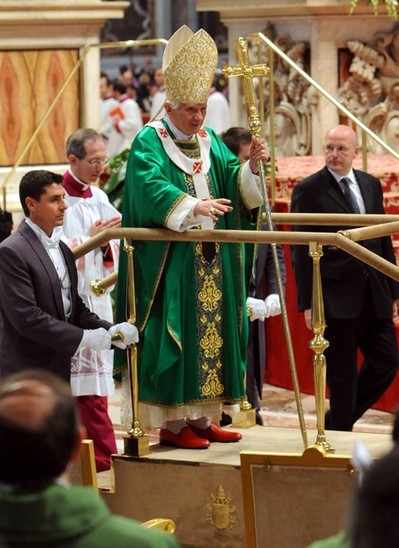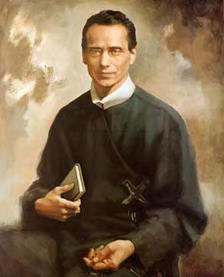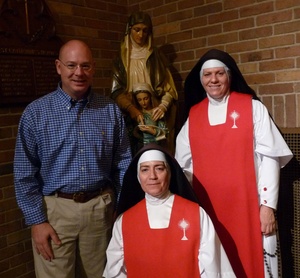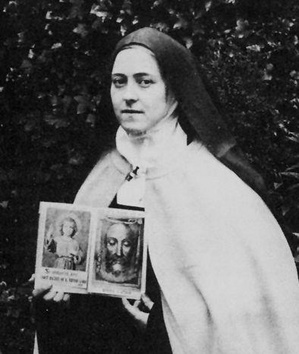October 2011 Archives
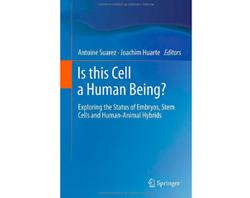
Is this Cell a
Human Being? Exploring the Status of Embryos, Stem Cells and Human-Animal
Hybrids (Springer, $139; slightly less expensive on Amazon). Antoine Suarez and Joachim Huarte are the editors. The book follows the 2009 meeting of international experts who worked with the ethical considerations of human
cell use and the implications and hope of the research.
The book has 10 articles and an introduction published by the Social Trends Institute of Spain and the US which explores matters of family, bioethics, culture & lifestyles and corporate governance. One of the contributors to Is this Cell is Dominican Father Nicanor Austriaco of Providence College. Father Nicanor is also the author of the popular monograph, Understanding Stem Cell Research: Controversy and Promise (www.kofc.org/un/en/resources/cis/cis326.pdf).
Of their new work STI said, "The central question of this book is whether or not particular cell entities of human origin ought to be considered human beings."
The CNA article is here.
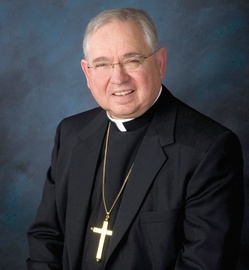
On 25 October 2011, Los Angelus Archbishop José H. Gomez, STD, 60, spoke on the slow loss of America's first freedom. On March 1, 2011, Archbishop Gomez became the Archbishop of Los Angelus, after being the Archbishop of San Antonio; he's been a bishop for nearly 11 years. A stellar article follows:
There is much evidence to suggest that our society no longer values the public role of religion or recognizes the importance of religious freedom as a basic right. As scholars like Harvard's Mary Ann Glendon and Michael Sandel have observed, our courts and government agencies increasingly treat the right to hold and express religious beliefs as only one of many private lifestyle options. And, they observe, this right is often "trumped" in the face of challenges from competing rights or interests deemed to be more important.
These are among the reasons the U.S. Catholic bishops recently established a new Ad Hoc Committee for Religious Liberty. My brother bishops and I are deeply concerned that believers' liberties--and the Church's freedom to carry out her mission--are threatened today, as they never have been before in our country's history.
Catholics have always believed that we serve our country best as citizens when we are trying to be totally faithful to the teachings of Jesus Christ and his Church. And since before the founding of the American Republic, Catholics--individually and institutionally--have worked with government agencies at all levels to provide vital social services, education, and health care.
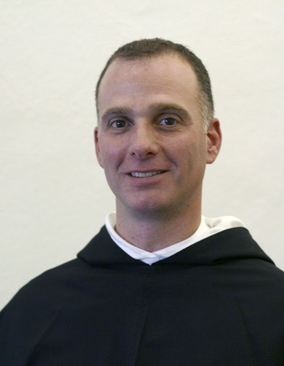 Several days ago the Dominican Friars of Saint Catherine of Siena Priory (NYC) elected Father Juan-Diego Brunetta, OP, as their new religious superior (their Father Prior).
Several days ago the Dominican Friars of Saint Catherine of Siena Priory (NYC) elected Father Juan-Diego Brunetta, OP, as their new religious superior (their Father Prior).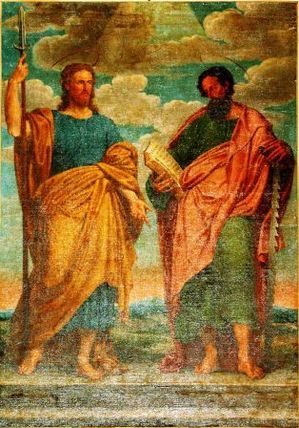 O God, who by the blessed Apostles have brought us to
acknowledge your Name, grant graciously, through the intercession of Saints
Simon and Jude, that the Church may constantly grow by increase of the people
who believe in you.
O God, who by the blessed Apostles have brought us to
acknowledge your Name, grant graciously, through the intercession of Saints
Simon and Jude, that the Church may constantly grow by increase of the people
who believe in you.
Vespers
We will celebrate the ancient and beautiful liturgy of Solemn First Vespers for All Saints, officiated by our special guest, Father Uwe Michael Lang, C.O. Father Bruno Shah, O.P. from Saint Vincent Ferrer, and Father Michael Barone from the archdiocese of Newark, will assist in the liturgical celebration. Gregorian chant and polyphonic settings will be provided by a professional choir led by David J. Hughes, Organist & Choirmaster at Saint Mary's Church, Norwalk, CT.
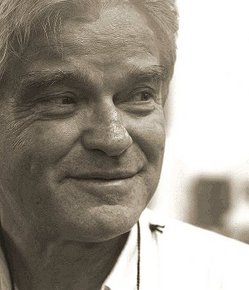 Father Aldo Trento, 64, hails from Belluno, Italy. Father Aldo is a priest of the Missionary Fraternity of Saint Charles Borromeo and has been living in Paraguay since 1989; currently he is the pastor of San Rafaél Church, Asunción. The life of this parish generated the Clinic "Divine Providence Saint Richard Pampuri Home" for the terminally ill and for the poor. Moreover, Father Aldo has established an elementary school, a shelter for pregnant women who suffered sexual abuse, four homes for orphans affected by HIV/AIDS, a shelter for chronically-ill children, and two residences for poor and abandoned elderly people. At the present time they are building new facilities for the Clinic as well as a vocational school with several subject concentrations to facilitate the introduction of the youths who complete their primary education at Pai Alberto School into the job market. In June 2008, Father Aldo has been named a "Knight of the Star of Solidarity", by the president of Italy, Giorgio Napolitano. In September 2008 he was also designated an illustrious citizen of the city of Asunción by the City Council.
Father Aldo Trento, 64, hails from Belluno, Italy. Father Aldo is a priest of the Missionary Fraternity of Saint Charles Borromeo and has been living in Paraguay since 1989; currently he is the pastor of San Rafaél Church, Asunción. The life of this parish generated the Clinic "Divine Providence Saint Richard Pampuri Home" for the terminally ill and for the poor. Moreover, Father Aldo has established an elementary school, a shelter for pregnant women who suffered sexual abuse, four homes for orphans affected by HIV/AIDS, a shelter for chronically-ill children, and two residences for poor and abandoned elderly people. At the present time they are building new facilities for the Clinic as well as a vocational school with several subject concentrations to facilitate the introduction of the youths who complete their primary education at Pai Alberto School into the job market. In June 2008, Father Aldo has been named a "Knight of the Star of Solidarity", by the president of Italy, Giorgio Napolitano. In September 2008 he was also designated an illustrious citizen of the city of Asunción by the City Council.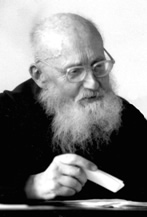 Anyone who knows even a little of the scholarship on the Rule of St Benedict knows the name of this famous monk who has done a tremendous amount of work in this area. Father Adalbert was indeed a force to be reckoned with, even if you disagreed with him. One could not escape Father's orbit. Sadly, I mention his death.
Anyone who knows even a little of the scholarship on the Rule of St Benedict knows the name of this famous monk who has done a tremendous amount of work in this area. Father Adalbert was indeed a force to be reckoned with, even if you disagreed with him. One could not escape Father's orbit. Sadly, I mention his death.A timely piece to think seriously about daily is the notion of religious freedom not only around the globe, but also and significantly here in the USA. Today, the Most Reverend William E. Lori addressed the Judiciary Committee of the United States House of Representatives, Subcommittee on the Constitution. Here are a few paragraphs (the link to the full text is noted below):
Religious liberty is not merely one right among others, but enjoys a certain primacy. As the Holy Father, Pope Benedict XVI recently explained: "It is indeed the first of human rights, not only because it was historically the first to be recognized but also because it touches the constitutive dimension of man, his relation with his Creator." (Pope Benedict XVI, Address to Diplomatic Corps, 10 Jan. 2011.) The late Pope John Paul II taught that "the most fundamental human freedom [is] that of practicing one's faith openly, which for human beings is their reason for living." (Pope John Paul II, Address to Diplomatic Corps, 13 Jan. 1996, No. 9.) Not coincidentally, religious liberty is first on the list in the Bill of Rights, the charter of our Nation's most cherished and fundamental freedoms. The First Amendment begins: "Congress shall make no law respecting an establishment of religion, or prohibiting the free exercise thereof...." It is commonly, and with justice, called our "First Freedom."
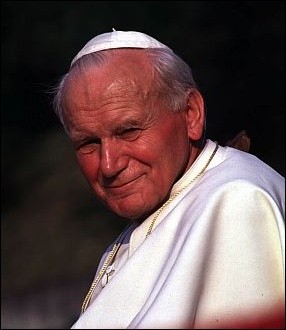
Today is the first time the Church prays the Mass for the liturgical memorial of Blessed John Paul II. To date, Blessed John Paul II's feast is observed in the USA as an optional memorial. The US Conference of Bishops is requesting of the Holy See that this feast be an obligatory liturgical memorial. The second reading for the Office of Readings is here. Other texts for Mass and the Divine Office are taken from the "Common of Pastors: For a Pope."
The Collect (opening prayer for Mass) is given here in English and Latin:
O God, who are rich in mercy and who willed that the Blessed John Paul II should preside as Pope over your universal Church, grant, we pray, that instructed by his teaching, we may open our hearts to the saving grace of Christ, the sole Redeemer of mankind. Who lives and reigns.
Deus, dives in
misericórdia, qui beátum Ioánnem Paulum, papam, univérsae Ecclésiae tuae
praeésse voluísti, praesta, quaésumus, ut, eius institútis edócti, corda nostra
salutíferae grátiae Christi, uníus redemptóris hóminis, fidénter aperiámus. Qui
tecum.
The Scripture would be: first reading is Isaiah 52:7-10; the responsorial psalm is 96/95:1-2a, 2b-3, 7-8a, 10); the alleluia is John 10:14; the Gospel is John 21:15-17.
The Congregation for Divine Worship and the Discipline of the Sacraments published on April 2, 2011, the "Decree Concerning Liturgical Worship in Honour of Blessed John Paul II."
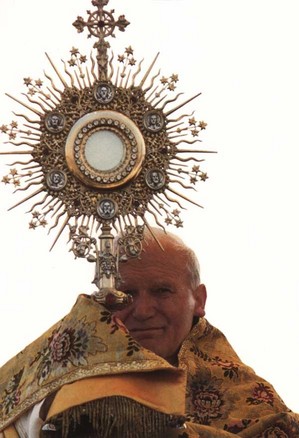
"The absolute, and yet sweet and gentle, power of the Lord responds to the whole depths of the human person, to his loftiest aspirations of intellect, will and heart. It does not speak the language of force, but expresses itself in charity and truth.
The new Successor of Peter in the See of Rome today makes a fervent, humble and trusting prayer: Christ, make me become and remain the servant of your unique power, the servant of your sweet power, the servant of your power that knows no dusk. Make me a servant: indeed, the servant of your servants....
Do not be afraid. Open, I say open wide the doors for Christ. To his saving power open the boundaries of states, economic and political systems, the vast fields of culture, civilization and development.
Do not be afraid. Christ knows "that which is in man". He alone knows it.
So often today, man does not know that which is in him, in the depths of his mind and heart. So often he is uncertain about the meaning of his life on this earth. He is assailed by doubt, a doubt which turns into despair.
We ask you, therefore, we beg you with humility and with trust: let Christ speak to man. He alone has words of life, yes, of life eternal."
Pope John Paul II
Homily at the Beginning of the Pontificat
22 October 1978
Office of Readings for the Liturgical Memorial
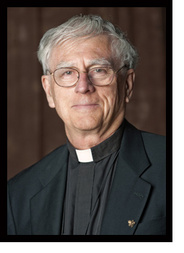
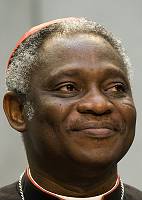
The "Day of reflection, dialogue and prayer for peace and justice in the world: Pilgrims of Truth, Pilgrims of Peace," is to take place in Assisi on 27 October. The event needs our prayer and solidarity.
Cardinal Peter Kodwo Appiah Turkson, president of the Pontifical Council for Justice and Peace had a press conference in which he said, "Following two and a half decades of collaboration and joint witness among religions, it is time to assess the results and to re-launch our commitment in the face of new challenges."
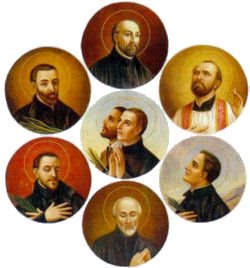
Saint Isaac Jogues wrote, "My confidence is placed in God who does not need our help for accomplishing his designs. Our single endeavor should be to give ourselves to the work and to be faithful to him, and not to spoil his work by our shortcomings"
Saint John de Brébeuf, pray for us.
Saint Isaac Jogues, pray for us.
Saint Gabriel Lalemant, pray for us.
Saint Anthony Daniel, pray for us
Saint Charles Garnier, pray for us.
Saint Noël Chabanel, pray for us.
Saint René Goupil, pray for us.
Saint John de la Lande, pray for us.
On October 14, 2011 Pope Benedict XVI received Father Julián Carrón, President of the Fraternity of Communion and Liberation, in audience in the Apostolic Palace, the day before the Vatican meeting on "New Evangelizers for a New Evangelization," a two day event that will culminate in the Mass with the Pope on Sunday at 9:30 in Saint Peter's Square. What follows is an interview with Vatican Radio's Alessandro Gisotti (emphasis mine).
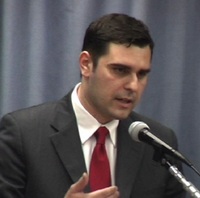
Alessandro Gisotti interviewed Fr. Carrón about tomorrow's meeting and the challenge of the new evangelization.
Father Julián Carrón: The first thing I would like to express is how grateful and moved I am at this opportunity the Holy Father has given me to be with him in this audience, because it enabled me to tell him how, in this moment of travail due to the social, cultural, and economic situation, we are seeing that when people verify the faith in their own life circumstances, they flower into a type of person that leaves us speechless. Being able to share with him living the faith, as he testifies it to us, was a true consolation.
How important is this meeting? How important is the Pope's challenge for a new evangelization?
Since the found of the Pontifical Council for the New Evangelization with Archbishop Rino Fisichella as its president, all eyes looked to today's event in the Pope Paul VI Auditorium with nearly eight thousand people from every continent gathered in Rome to experience what it means to share the Faith of Jesus Christ with others through word and music. Pope Benedict attended part of the gathering and said, "The world today needs people who proclaim and witness that Christ is the one who teaches us the art of living, the way of true happiness, because He himself is the way of life."
Archbishop Fisichella invited Mother Veronica Berzosa, founder of Iesu Communio, a religious community of women dedicated to the evangelization of the youth, Italian writer Vittorio Messori who spoke about the reasons to believe, and the Italian scientist Marco Bersanelli who spoke on about the dialogue between science and faith. Colombian bishop Fabio Suescun, spoke to those assembled on experiences of the New Evangelization in Latin America.
For many, it was beautiful to hear Andrea Bocelli who said:
"I think I owe my faith to an internal search, the rejection of the idea of feeling like I was the product of coincidence. I followed my road, I hope to do so consistently, even when certain episodes of life make us tremble and feel weak before our convictions."
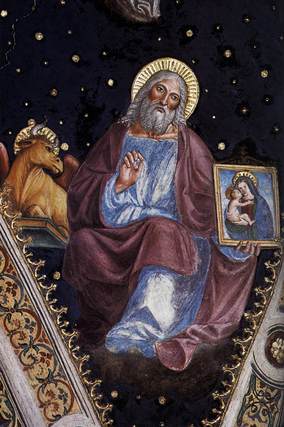 [Saint Luke] told of the power of the Lord, and his praise. (MP resp.)
[Saint Luke] told of the power of the Lord, and his praise. (MP resp.)Patriarch Béshara Raï, 71, is making a pastoral visit to the Maronite Catholic communities in both US eparchies from 4 to 23 October 2011. His Beatitude will visit Eparchy of Our Lady of Lebanon and the Eparchy of St Maron of Brooklyn.
President Barack Obama has roundly refused to meet the Patriarch. Bishop Gregory openly makes the case that it is a mistake of the current administration to ignore His Beatitude's visit to the USA.
Béshara Raï, was elected on March 15, 2011 as the 77th Patriarch of the Maronite Church.
Bishop Gregory's letter:
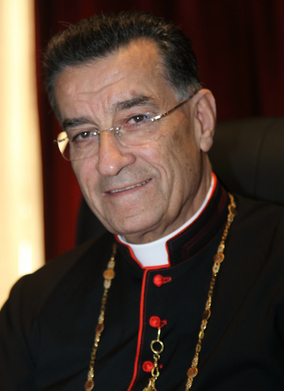
September 30, 2011
Dear Mr. President:
I am terribly disappointed with the rebuff of Patriarch Bechara Peter Rai who is the Catholic leader of the Maronites worldwide and one of the most respected Christian leaders in Lebanon and the Middle East . The motto of his coat of arms reflects his personality and is call for "communion and love." He has been trying to achieve what no other Middle Eastern political or a religious leader has been able to do: meet others with respect and love, not take sides, and build bridges to a future that will hopefully lead to peace and happiness for all people in the Middle East.
Muslim and Christian groups have all found in him a real father, a Patriarch. Because he has spoken out expressing his concern for the future of Christians in the Middle East , he has been rebuffed by you and your Administration. It is pure hypocrisy for the leader of the free world to refuse to meet with Patriarch Rai especially since the Prime Minister of Israel can come and completely disregard essential parts of a peace plan and still be given a warm welcome, and the King of Saudi Arabia, where Christians have no freedom whatsoever, can be received with highest honors. Mr. President, you are ignoring the plight of Christians in the Middle East!
Patriarch Rai's warning about the future of Christians in Syria is not taboo. Christians are in a state of peril in the same way that Christians of Iraq were a few years ago when two thirds of them migrated out of the country and are still not protected to this day. To say the Patriarch supports dictators and sides with terrorists is pure nonsense. With his own unique charisma, Patriarch Rai has reached out to all Lebanese with whom he has to live side-by-side. It is a beautiful outreach, one that is uniquely his, without having to be beholden to anyone. He speaks with love and tempers the divisive, hateful talk of many. He gives hope
A new day is dawning in the Middle East. The Arab Spring is happening with little vision for the summer that will ensue. Mr. President, you do not have to agree on everything with Patriarch Rai, but there is no need to avoid or rebuff him. By doing so, you are showing your disrespect for him and for all Christians of the Middle East.
 + Gregory J Mansour
+ Gregory J MansourBishop of the Eparchy of Saint Maron of Brooklyn

Indeed! There is no separation between spiritual and religious. The soul needs integration of each to make any real sense.Faith is remembering the exquisite gifts of God given us in particulars of space and time and people; faith is having the guts to say 'yes' when you have no idea what the 'yes' means; the 'yes' is given in response to a mystery.With regard to the spiritual/religious distinction often made: the two are complementary and have a convergence.
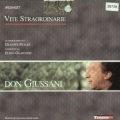 On October 8, 2011, a film series co-sponsored by the Siena Forum for Faith and Culture and Crossroads Cultural Center on extraordinary Christian lives concluded with the showing of the documentary conducted by Elena Guarnieri of "Vita Straordinarie: Don Luigi Giussani" (Extraordinary Lives: Fr. Luigi Giussani") on the life and work of Monsignor Luigi Giussani, called: the priest wounded by beauty by Pope Benedict when he offered the Sacrifice of the Mass for the repose of Giussani's soul on 25 February 2005.
On October 8, 2011, a film series co-sponsored by the Siena Forum for Faith and Culture and Crossroads Cultural Center on extraordinary Christian lives concluded with the showing of the documentary conducted by Elena Guarnieri of "Vita Straordinarie: Don Luigi Giussani" (Extraordinary Lives: Fr. Luigi Giussani") on the life and work of Monsignor Luigi Giussani, called: the priest wounded by beauty by Pope Benedict when he offered the Sacrifice of the Mass for the repose of Giussani's soul on 25 February 2005.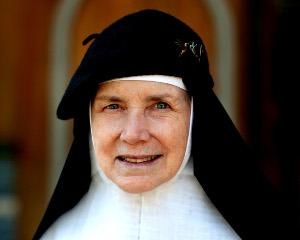
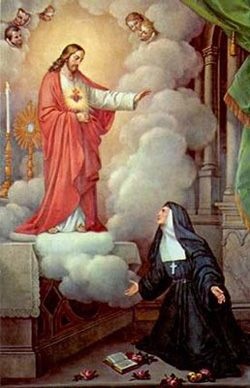
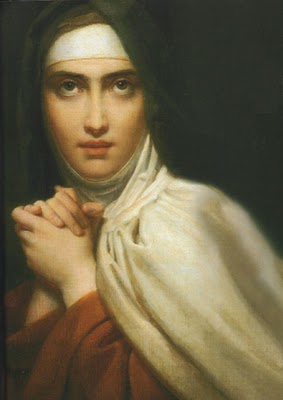
Today, the Church puts on our lips at the entrance antiphon a wonderful psalm verse that captures Saint Teresa of Avila to a "T": As the deer longs for streams of water, so my soul longs for you, O God. My soul thirsts for God, the living God. When can I enter and see the face of God? (Psalm 42: 2-3).
Teresa of Avila is one of my favorite Spanish saints: her intensity is beyond compare, her fidelity is extraordinary. I was searching for something on Saint Teresa and I found the following from our Holy Father. These few paragraphs really capture for me what the Christian life is about, what Teresa was about, what I want to be about. Perhaps what the pope says will orient your thoughts today:
It is far from easy to sum up in a few words Teresa's profound and articulate spirituality. I would like to mention a few essential points. In the first place St Teresa proposes the evangelical virtues as the basis of all Christian and human life and in particular, detachment from possessions, that is, evangelical poverty, and this concerns all of us; love for one another as an essential element of community and social life; humility as love for the truth; determination as a fruit of Christian daring; theological hope, which she describes as the thirst for living water. Then we should not forget the human virtues: affability, truthfulness, modesty, courtesy, cheerfulness, culture.
This coming year Pope Benedict is going to spend time teaching matters of Justice. In fact, he's called for a new emphasis on Justice several times in the past year. St John's University is a college operated by the Congregation of the Mission (the Vincentians), the religious order founded by the great Saint Vincent de Paul who had a special love for the poor and marginalized but also taught that one can't effectively serve the poor without an intimate relationship with Jesus Christ. For Saint Vincent de Paul, in order to walk with the poor one had to first first walk with the Lord. To that end, the Vincentian Fathers, Brothers and laity organized the Vincentian Center for Church and Society.
Next week, there is the 7th Biennial Vincentian Chair of Social Justice at St. John's University (Queens, NY Campus) on "Poverty Eradication and Intergenerational Justice: Stewardship, Solidarity and Subsidiarity" to take place on October 22, 2011.
More information can be found here: Poverty Eradication and Intergenerational Justice.pdf
"New Evangelizers for the New Evangelization - The Word of God grows and spreads" in a spirit of joy
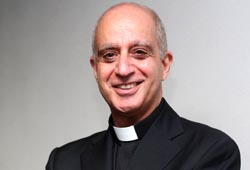
How does one evangelize? Why does one evangelize? Or not? Tomorrow in Rome, Archbishop Rino Fisichella, President of the Pontifical Council for Promoting the New Evangelization, will host a meeting entitled "New Evangelizers for the New Evangelization : The Word of God Grows and Spreads." In a recent interview, Fisichella said:
"For new evangelization, this [the issue of immigration] is certainly a factor to be taken seriously, because we have millions of Christians on the move in different countries, bringing with them not only the richness of their Christian experience, but who also come to meet the challenges which Europe in particular but also the United States present, with regards to secularization".
"... we want to reinforce that evangelisation is the very mission of the Church and it has been going on for over two thousand years, but it needs to find a new language, a new lifestyle one that is respectful but has a deeply rooted identity", evangelisers "who have a profound sense of belonging to the Church and the Christian community but at the same time who are open to others. And also a good dose of joy and enthusiasm, which is never a bad thing!"
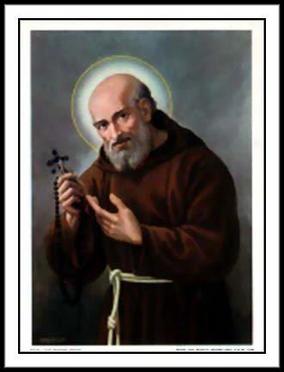
More of the simple lay friars were made saints than the Capuchin priest friars. I wonder why? But a snippet from a biography on Saint Seraphin may be helpful to get a sense of the man:
In 1556, Felix repeated his request to the provincial minister who admitted him to the novitiate at Jesi, where Felix received the name, Seraphin. Upon his reception into the Order, Seraphin remarked, "I have nothing‹just a crucifix and a rosary‹but with these I hope to benefit the friars and become a saint."
Although he was not totally illiterate, Seraphin could speak about God more eloquently than any theologian. Even the bishop of Ascoli, the eminent theologian, Cardinal Bernerio, sought Seraphin's advice in especially difficult cases.
With himself, Seraphin was austere. Only once in his life did he accept a new habit, and then, only out of obedience. For 40 continuous years, all he ate was soup or salad. In keeping with the spirituality prevalent at the time, Seraphin had a personal devotion of serving as many eucharistic liturgies as possible.
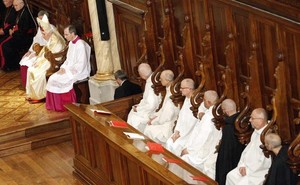 In speaking at a Charterhouse on October 9, Pope
Benedict contrasted modern life and the monastic life saying that society
"throws light on the specific charism of the Carthusian monastery as a
precious gift for the Church and for the world, a gift which contains a
profound message for our lives and for all humanity. I would summarise it in
these terms: by withdrawing in silence and solitude man, so to speak, 'exposes'
himself to the truth of his nakedness, he exposes himself to that apparent
'void' I mentioned earlier. But in doing so he experiences fullness, the
presence of God, of the most real Reality that exists. ... Monks, by leaving
everything, ... expose themselves to solitude and silence so as to live only
from what is essential; and precisely in living from the essential they
discover a profound communion with their brothers and sisters, with all
mankind".
In speaking at a Charterhouse on October 9, Pope
Benedict contrasted modern life and the monastic life saying that society
"throws light on the specific charism of the Carthusian monastery as a
precious gift for the Church and for the world, a gift which contains a
profound message for our lives and for all humanity. I would summarise it in
these terms: by withdrawing in silence and solitude man, so to speak, 'exposes'
himself to the truth of his nakedness, he exposes himself to that apparent
'void' I mentioned earlier. But in doing so he experiences fullness, the
presence of God, of the most real Reality that exists. ... Monks, by leaving
everything, ... expose themselves to solitude and silence so as to live only
from what is essential; and precisely in living from the essential they
discover a profound communion with their brothers and sisters, with all
mankind".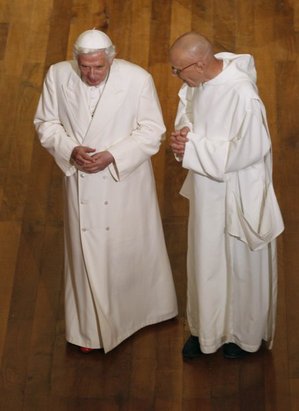
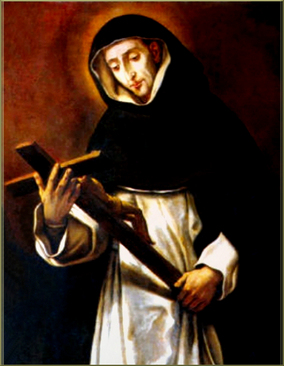
O God, through mortification of the body and preaching of the faith, you raised the blessed Louis, your confessor, to the glory of the saints; grant that what we profess by faith we may ever fulfill by works of piety.
The preaching one hears from a member of the Order of Preachers ought to lead each person to a deeper relationship with God. Saint Louis Bertrand said, "If because of your preaching men lay aside enmities, forgive injuries, avoid occasions of sin and scandals, and reform their conduct, you may say that the seed has fallen on good ground. But to God alone give all the glory and acknowledge yourselves ever unprofitable servants."
~Saint Louis Bertrand to the young Dominican students
Let us pray through Saint Louis Bertrand's intercession for the Church in the Americas and the Islands.
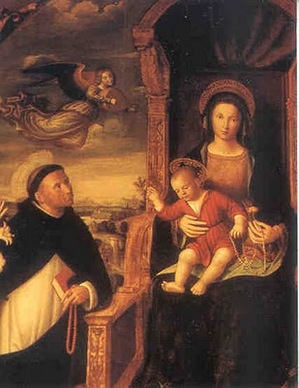 The rosary is essential to the life of Christians. We ought to live the rosary.
The rosary is essential to the life of Christians. We ought to live the rosary.Every 5 years a bishop is to make a visit to the Eternal City first to pray at the tombs of Saints Peter and Paul and secondly to make a report to the Pope (and his curia). The church-term for such a meeting is called the "ad limina" -- to the threshold of the apostles, the Church, the heartbeat of our faith. It is not a meeting of checking-in with the CEO, CFO and the COO of the company. For a bishop is not a branch manager. This is a gesture of communion between two people who are in love with Christ and His sacrament, the Church; it is a meeting of one pastor meeting the Supreme Pastor, Christ, through the ministry of the See of Peter. It is a time to verify the good being done and to get feedback about what more needs to be done for the good of the faithful. With Benedict's age I think the 5-year meeting is now about every 7 years.
In recent weeks, Benedict has been meeting with Indonesian bishops. Part of his concluding address to the latest group has an encouragement to advocate inter-religious dialogue. As you can tell, Pope Benedict XVI is a pope of dialogue. The relevant paragraph follows:
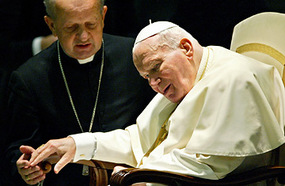 Well, that's a question. Provocative or not, I am quiet sure that it is germane 6 years later with little evidence. But Time magazine's Jeff Israel brings to our attention the hypothesis of Dr Lina Pavanelli who, in an article, "The Sweet Death of Karol Wojtyla" (Micromega), claims Blessed John Paul II was euthanized. The first thing I think of is: someone is trying to make a book deal with conspiracy theory accusing the Vatican of hiding something. But I am wondering, as Israel pointed out, that if the issue is actually the doctor's reception of Church teaching on life --or not--, especially on issues like euthanasia. Many in the medical community want to dismiss the Church's teaching on life in order to liberalize medicine enough to reduce the dignity of the human person to absurdity. There's a vibrancy in questioning Magisterial teaching on life in Europe because of proposed legislation.
Well, that's a question. Provocative or not, I am quiet sure that it is germane 6 years later with little evidence. But Time magazine's Jeff Israel brings to our attention the hypothesis of Dr Lina Pavanelli who, in an article, "The Sweet Death of Karol Wojtyla" (Micromega), claims Blessed John Paul II was euthanized. The first thing I think of is: someone is trying to make a book deal with conspiracy theory accusing the Vatican of hiding something. But I am wondering, as Israel pointed out, that if the issue is actually the doctor's reception of Church teaching on life --or not--, especially on issues like euthanasia. Many in the medical community want to dismiss the Church's teaching on life in order to liberalize medicine enough to reduce the dignity of the human person to absurdity. There's a vibrancy in questioning Magisterial teaching on life in Europe because of proposed legislation.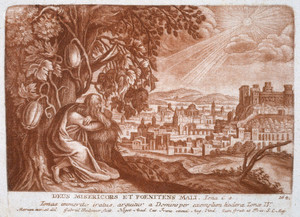 Spending time doing lectio divina on today's reading at Mass taken from the Prophet Jonah, would you say that Jonah's anger was justified? How do you characterize his relationship with God? Your relationship with God?
Spending time doing lectio divina on today's reading at Mass taken from the Prophet Jonah, would you say that Jonah's anger was justified? How do you characterize his relationship with God? Your relationship with God?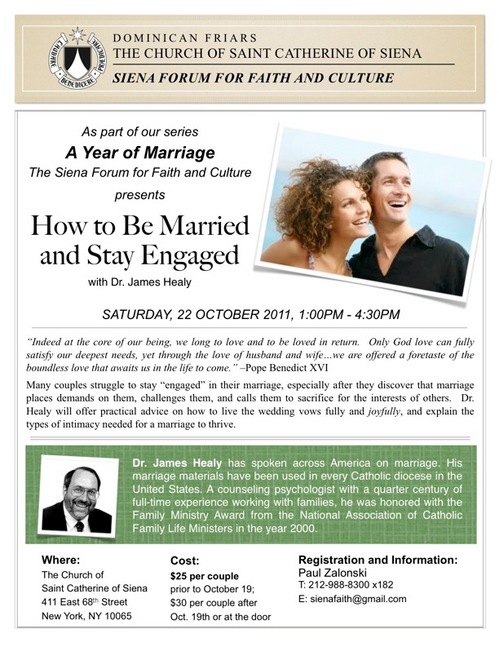
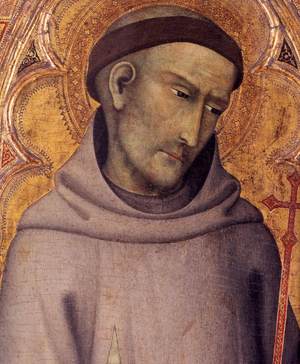 Francis, the man of God, left his home behind, abandoned his inheritance and became poor and penniless, but the Lord raised him up.
Francis, the man of God, left his home behind, abandoned his inheritance and became poor and penniless, but the Lord raised him up.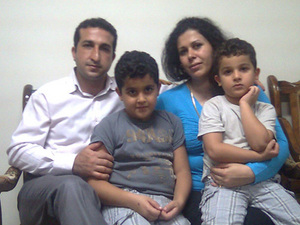 Yousef Nadarkhani, 33, is a Christian; he's never practiced Islam, the faith of his family. He converted Christianity at the age of 19. A court ruled that he's guilty of apostasy but he's also being accused of security charges, running a brothel, being a rapist and being a Zionist. And now he faces death.
Yousef Nadarkhani, 33, is a Christian; he's never practiced Islam, the faith of his family. He converted Christianity at the age of 19. A court ruled that he's guilty of apostasy but he's also being accused of security charges, running a brothel, being a rapist and being a Zionist. And now he faces death.  "Magdalene's Song," is a film by Mauro Campiotti about Blessed Mary Magdalene of the Incarnation (Caterina Sordini) foundress of the Perpetual Adorers of the Blessed Sacrament, an order of contemplative nuns who had an extraordinary relationship with the Lord and devotion to the Church in a time of great difficulty.
"Magdalene's Song," is a film by Mauro Campiotti about Blessed Mary Magdalene of the Incarnation (Caterina Sordini) foundress of the Perpetual Adorers of the Blessed Sacrament, an order of contemplative nuns who had an extraordinary relationship with the Lord and devotion to the Church in a time of great difficulty.The Director, Mauro Campiotti, and 4 nuns from the Perpetual Adorers of the Blessed Sacrament were present to answer questions at the end of the film.
